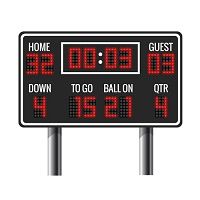That Sinking Feeling: How to Pull Yourself Out of the Sunk Cost Trap
Sometimes our biggest wins aren't the investments with the biggest net gains.

All things financial interest me (excuse the pun), but I am particularly piqued by financial concepts that interact with psychology. This is, perhaps, because I have dealt with many of these issues myself as an investor, and I often wonder why I do the things that I do. In previous columns, our sister site has covered the instant gratification trap, and here we’ve covered the concept of paying yourself first, among other topics.
There’s another intersection between finance and psychology that I think a lot about, in part because it derails the long-term strategy of many investors: the sunk cost trap.
What is the sunk cost trap?
Have you ever driven through hideous traffic to a football game, grilled some burgers and brats in the parking lot, gone through security, spent $10 for a thimble full of beer, and then, in the first quarter, your team is getting trounced 21-0? If you sat through the next three quarters, even though your team had no chance of coming back, you’ve fallen victim to the sunk cost trap. You stayed until the end because of the time and effort you had invested to get that far.
A financial sunk cost is an expense that has already been incurred and thus cannot be recovered. Good investors take emotions out of their decisions and make choices independent of what has come before. Why? Because the past costs won’t ever change. A good investor should consider only what may possibly change: the future cost and return of the investment.
This concept makes logical sense, but it can be hard to separate emotion from logic. That’s because your purchase of that “little stock that could” involved more than your dollar investment. Chance are, you invested emotionally in it, too. You saw the profits and stock price of Snake Oil Ventures (SOV) slowly rise from nothing, and you began to feel pride of ownership and validation of your investing strategy. Perhaps you ran that pride all the way to worthlessness as SOV’s stock withered and died.
How can you avoid the trap?
Consider every future financial investment based only on its current and future benefit to your portfolio. Costs you have already incurred will never change, but they really are immaterial to the future benefit or loss. This will mean taking—and accepting—some losses. Take solace in the fact that every single investor takes losses. If you’re ever having lunch with iconic investors Carl Icahn or Warren Buffett, ask them for a brief overview of their losses, and you’ll have enough conversation to last through breakfast the next morning.
They’ll also tell you, though, that leaving those sunk costs behind was among their favorite and most important investing decisions. Sometimes our biggest wins aren’t the investments with the biggest net gains. They are missteps avoided, bad paths not taken even though they looked tempting at the time.
ACTIVA BioACTIVE Bulk Flow Marks Pulpdent’s First Major Product Release in 4 Years
December 12th 2024Next-generation bulk-fill dental restorative raises the standard of care for bulk-fill procedures by providing natural remineralization support, while also overcoming current bulk-fill limitations.